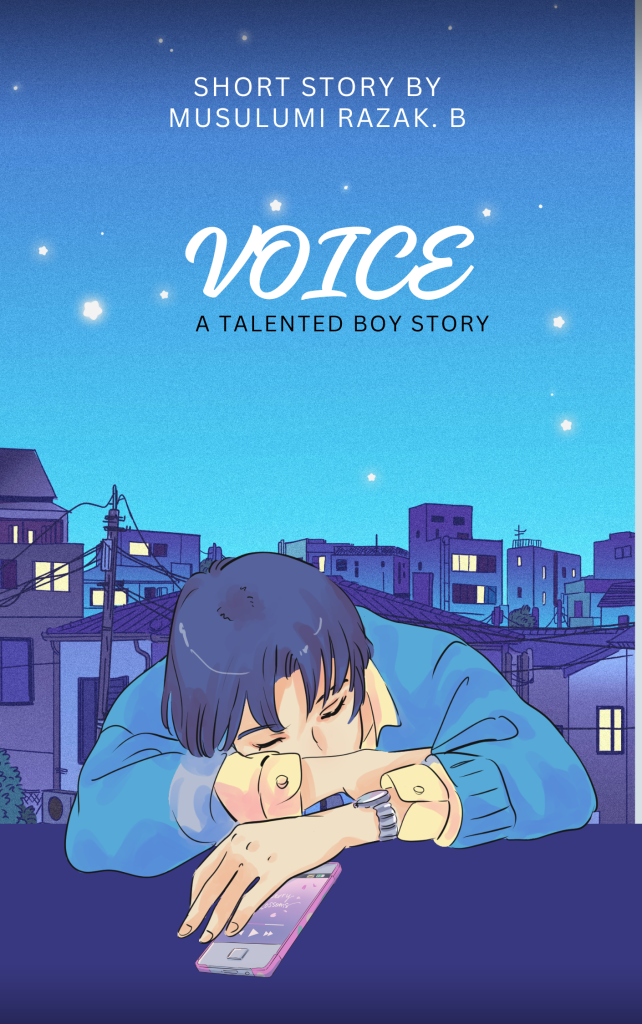The hook had begun for Akpan by taunting the sacred Akoma tree in Akomoba village when he returned that fateful May. Akpan was appalled by the reverence the villagers still gave it; 25 years after he had left for the city. Every day from his arrival, he watched as all cadres of the villagers came to its roots bearing gifts and sacrifices fit for kings. The children and women watered its sturdy roots daily, and the men pruned its branches and leaves.
That fine morning, he ventured to the tree, determined to challenge it. Amidst his taunting, he must have jested too far when he said, ‘If you’re so powerful, then I wish you take me back to when I was 13 in this village. I have some advice for my younger self.’
Immediately, he felt a bright flash that seemed to bleach the cones and rods of his eyes. After the rays diminished, Akpan opened his eyes, blinking to adjust to the natural lighting.
He had somehow reached the village school facing the village playground; it was break time and children were dancing as they sang rhymes that brought back the happy memories of innocence. His eyes widened in shock as disbelief spread over his countenance like a cloak. His 13-year-old self was sitting alone at the door post while the other students played.
The tree had honored his wish but now, it was time for him to honor his. Before Grandma passed, she had to force tales of the tree’s power into his ears. One of its rules had been: If you ever went back to the past with the tree, you must fulfill the purpose behind your trip to be able to return and you must never let the version of you in that past know that you’re from the future.
He felt like a fool. He wondered how gullible he had been to think that there was no power in tradition. But then, 25 years of rarefied air and urban living in the city had made his approach to life purely realistic. Its spiritual parts did not interest him. Thankfully, he had advice for his younger self. Advice that he knew would change the boy’s life.
Sucking in a breath, he cautiously walked to the boy and gently sat on the space beside him.
The boy was startled but his expression returned to its forlorn demeanor.
‘Hello. Why are you sitting alone?’ Akpan asked.
The boy turned away, averting his gaze. The teachers had always warned them to avoid strangers.
‘Please do not be afraid to talk to me. I’m only here to help.’ Quickly, Akpan added, ‘I am a friend of your father, though it’s been long since I came to visit the village.’
The boy’s eyes lit up, turning to face him with joy plastered on his formerly sullen face.
‘Welcome, Uncle. I am happy to meet you. Have you come to visit my father?’
‘Well, in a way, yes, and in another, no. I came to visit you.’ Akpan replied. It surprised Akpan that he had used an ambiguity rooted in Akomoba culture. To them, men were seen as extensions of their fathers; women were seen as extensions of their mothers.
‘Me? Why, sir?’ The boy asked, skeptically.
‘Because I know you are not happy. Things have been bad at home since Father lost his eyesight and the hardship has been a lot with Mother refusing to work.’
Rage sparked through the little boy as he mentioned Mother’s refusal to work. Akpan had loathed her then for her obstinacy and laziness. She had excused herself based on culture saying a woman wasn’t meant to work; it was where his hatred for culture came from.
‘It’s not like I’m even asking her to work alone or to do the job all by herself. I’m ready to join her. I can hoe the field and till the ground. Yet she wants to watch us all starve for such silly excuses. And not even on the grounds of watching Father. I wish I had better-‘
The boy paused his ranting, angry tears falling from his eyes. He stopped himself abruptly, feeling condemnation for exposing his family’s dirty linen.
‘I share your pain, my friend.’ Akpan said, seeing an opportunity. ‘Your complaints are valid so I do not judge you. However, I have two things I’d like to tell you; things that could make you rich.’
It was like an instant effect; the boy’s eyes sparkled at the thought of money. His attention was sucked into Akpan; his ears, eager to listen and understand.
‘Tell me, kind sir. Tell me, please.’ He said.
‘I will but first, I need to show you something. Get me a ball and a pendulum bob with a hook.’ Akpan said.
‘Wow. The God we don’t see but who sees all must have brought you. Grandma always says He is a revealer of secrets. I just found a pendulum bob this morning. Give me a minute.’
The boy scurried off, running as fast as he could with the hole in his shoe. Akpan smiled remembering Grandma’s teachings. The boy returned with the items and Akpan took him to the school’s well.
As they reached the well, Akpan opened its cover.
‘Now I want to show you something. Hand me the ball. I’m going to throw it into the well.’ Akpan said, curtly.
The boy’s eyes widened, his hands curled behind him as he hid the ball out of sight.
‘Sir, this is my only prized possession.’ He protested. ‘I can’t let you throw it.’
‘For you to receive the wealth I have, you’re going to have to trust me. Please.’
‘When I become rich, I can buy another one, right?’
Akpan chuckled, lightly.
‘You might not need another one.’
The boy loosened his hands. He handed the ball over, avoiding eye contact.
Sucking in a breath, Akpan turned to the well and dropped the ball with a mild splash. The ball bobbed on the surface of the water. The frown returned to the boy’s face.
‘Now, hand me the pendulum bob.’ Akpan said.
The boy gave that without fussing. He didn’t know what it was anyway and it was very hard to play with it, owing to its hook.
‘Now, do you see the stick over there? The one with a nail on its edge?’
‘Yes sir.’
‘Bring it.’
The boy complied, hurriedly.
‘Now I will try to use this stick to bring out the ball. Let’s see what happens.’
Akpan knew it was going to fail but to make the experiment appear genuine, he tossed, poked, and prodded the ball a few times, trying to get it out.
‘It’s not going to work, kind sir.’ The boy finally said, sulking.
‘I see.’ Akpan said, looking thoughtful. ‘All right, let me try to pick the pendulum bob.’
Akpan gave it a few tosses, before aiming for its hook and then gradually brought it out. He dropped the stick and handed the rescued bob to the boy.
The lad’s eyes sparkled at the recovery.
‘Now, the essence of this is to never be entitled. Always remember that no one is coming to save you. Only you will have to be responsible for yourself. The ball believes it will always have someone else to care for and own it. It was designed to be loved, treasured, and coddled. That is how all humans are wired to think. From a young age, we begin to make demands on the ones we meet alive, asking them to provide for us, pet us when we cry, and then cater to us. But in truth, he who wants wealth and who desires to survive earth should be the pendulum bob.’
The teen went silent, digesting Akpan’s words.
‘But sir, didn’t the pendulum bob also need our help before it was saved?’
‘You are a very bright fellow. Yes, it did. Your observation takes us to the next rule of wealth. You must never believe you can grow wealthy alone. You cannot. You need people, relationships, and even the support of others, especially when you are just starting or going through a bad time.’
The boy grew visibly confused. ‘Doesn’t that rival the first advice? Isn’t the pendulum bob also entitled?’
‘No, it is not. It had a hook, the hook was what allowed us to save it. You must always have your hook. The hook is that part of you that makes you valuable to others. For some, the hook might be the trade they own. For another, the hook might be a talent they have developed. Yet again, it can be service rendered. But the hook is something that can be paid for, something that can constantly be exchanged for wealth. You should have more than one. In fact, aim for a hook, that doesn’t require your active presence. One that can multiply and still earn in your absence. Such hooks are called investments.’
The boy was silent; blown away as he mouthed the words ‘investments’.
‘Is it possible to get hooks like that? Without ever having to work?’
‘Do you see Farmer Dauda, the richest man in this town?’
The boy’s face suddenly crumpled up in disgust as he replied, ‘That corrupt man. Mother is always talking about how corrupt he is with his big cars and houses.’
‘There now, my friend. You have made me remember one more lesson. If you want to make wealth, you should never despise anyone with wealth or affluence of money. You should only do so when you’re sure the money is truly corrupt with evidence.’
The boy’s eyes softened as he nodded.
‘Now, Farmer Dauda has several houses, scattered across the village. He rents them out to visitors, corpers, and even other villagers. If the rent for one, was #250 and it was multiplied across five houses, how much would he have?’
The boy did the computation quickly, his eyes widening as he realized the amount it came to. He could now see why Farmer Dauda was rich; he wasn’t corrupt.
‘That is such huge money and he didn’t even do anything.’ The boy squealed.
‘Exactly. You can observe closely other businesses of the same nature that he and a few other rich people in the village have.’
The boy smiled as he began to reflect.
‘So the reason why we might be poor is Mother keeps waiting for Father, I keep waiting for Mother and Father doesn’t have any hook aside himself?’
Akpan gave a wry smile as he nodded.
‘My final lesson is that you must learn to task your brain and get it to think. Ideas attract money, like magnets.’
The boy’s eyes lit up on hearing magnets. Akpan had been obsessed with that aspect of science; it was the influence that moved him to study physics.
‘I love magnets.’ The boy said. Akpan smiled back, ignoring the cringe he felt.
The boy stared at the well, his hand on his chin. He remained still for a while, until suddenly, he gave a loud shriek, screaming as he began to jump around.
‘If I use a small bucket like the one I use as a stool to sit at home, and I hammer a wooden stick into the mouth and tie a rope to its middle, I can drag out the ball.’
Akpan looked at the boy, with wonder. He had such a bright mind at a young age. For the first time, Akpan loathed himself for caging his mind, allowing his life to revolve strictly around his 9-5 job as a teacher, instead of allowing it to run wild into research and other aspects of physics that would have made him a powerful scientist.
‘I’m proud of you.’ He said to the boy. The lad continued to think hard. He quickly chippered, ‘What if I sold the pail I make to the school? Instead of getting the village wrestlers to use this stick to drag out buckets of water. The last wrestler we had stopped coming because his arms had begun to ache. We had no water today.’
‘It’s an amazing idea.’ Akpan said. ‘You have just found a good hook. If you can get a few of your classmates and nicely ask them to help you to create some, split the profits, you would not only get your ball, you could also make money selling to other people in the town.’
The boy’s face faltered as the thought of selling to the whole town filled him with dread.
‘But won’t it make me look poor or like a beggar?’
Akpan gave a light scoff.
‘Imagine if the pendulum in your hand was turned on its back and we couldn’t see the hook, wouldn’t it have just become like the ball? My friend, the one who sells should never feel ashamed. Don’t feel like they are doing you a favor with their money. No, you are doing them a favor by giving them a better way to fetch water.’
The boy’s smile eased and immediately the village school bell rang signaling the end of the break.
‘Well, my friend,’ Akpan said, ‘I had promised you two ways to make you rich and I have shown you four.’
‘Thank you.’ The boy replied.
Akpan cast his eyes into the well after returning the stick to the corner.
‘Well, I advise you to create your idea quickly if you still love the ball and don’t want to go hungry anymore. Ideas don’t wait for anyone; they usually strike multiple people.’
‘I will. I really will.’ The boy started walking back into the class, leaving Akpan behind. Akpan wished he could wait to see this repurposed him grow.
As the boy entered the school, the bright light returned, engulfing Akpan. Akpan braced himself for the version of his now-altered future. He made a promise to go to apologize to the tree, irrespective of the outcome of this visit. It was worth it to him and his younger self.
He returned to the spot in the village that he had disappeared from. Except now, the tree was no longer where it was. All he saw was a stump; a weird hook-shaped stump.
He ran frantically around the spot in shock. He looked around the village and his village was now a city. Where there used to be huts, there now stood tall buildings and large industries. He would not have believed he was still in Akomoba if not for the addresses included on the banners of some of these tall buildings. He ran to an old woman who was weaving a basket nearby.
‘Ma, please what is today’s date?’ He said.
‘Chief, today is the 24th of May, 2023.’
The same date as two days ago when he had gone back to the past. And did she just say ‘Chief’?
‘Chief?’ Akpan said, startled.
‘I know that you will soon be governor. No vex, sir. Your Excellency.’
‘Where is the tree that used to be here?’
‘Sir, it was cut down years ago sir.’
‘By, who?’
The woman smiled at him as she finished the last weave on her basket. She got up and placed it in her right hand, then put the stool she was sitting on in the crook of her left arm.
‘Welcome to your new life.’ She said and walked away from a stunned Akpan, disappearing into the forest nearby.
![]()






